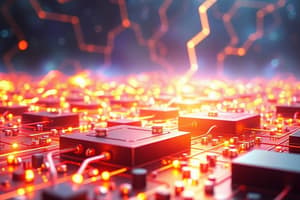Podcast
Questions and Answers
What is the classic example of a semiconductor material?
What is the classic example of a semiconductor material?
- Silicon (correct)
- Gallium arsenide (GaAs)
- Indium phosphide (InP)
- Germanium
Which semiconductor device amplifies signals by controlling electrical current passing through it?
Which semiconductor device amplifies signals by controlling electrical current passing through it?
- Microcontroller
- Integrated Circuits (ICs)
- Transistor (correct)
- Diode
What material is essential for diverse technological needs, along with silicon?
What material is essential for diverse technological needs, along with silicon?
- Aluminum
- Gallium arsenide (GaAs)
- Indium phosphide (InP)
- Germanium (correct)
Which semiconductor application attribute the ubiquitous presence of semiconductors to the endless array of products they facilitate?
Which semiconductor application attribute the ubiquitous presence of semiconductors to the endless array of products they facilitate?
What kind of flow direction does a diode enable in a semiconductor device?
What kind of flow direction does a diode enable in a semiconductor device?
Which element offers higher performance and compactness compared to discrete component solutions by holding numerous elements together on a single chip?
Which element offers higher performance and compactness compared to discrete component solutions by holding numerous elements together on a single chip?
What is at the core of semiconductor success stories?
What is at the core of semiconductor success stories?
Which step is NOT involved in fabricating advanced semiconductor devices?
Which step is NOT involved in fabricating advanced semiconductor devices?
What property of semiconductor materials enables engineers to fine-tune their electrical properties?
What property of semiconductor materials enables engineers to fine-tune their electrical properties?
What aspect of semiconductor devices determines whether electrons contribute to conduction or not?
What aspect of semiconductor devices determines whether electrons contribute to conduction or not?
Which industry is NOT mentioned as being revolutionized by versatile tools like semiconductors?
Which industry is NOT mentioned as being revolutionized by versatile tools like semiconductors?
What field encompasses a blend of material science, device engineering, manufacturing, and fundamental physical concepts?
What field encompasses a blend of material science, device engineering, manufacturing, and fundamental physical concepts?
Flashcards are hidden until you start studying
Study Notes
Semiconductors: Materials, Devices, Applications, Manufacturing, Physics
Semiconductors form the foundation of modern technology, powering our digital world with their unique electronic properties. To understand this influential sector better, let's dive into each aspect—materials, devices, applications, manufacturing, and semiconductor physics.
Semiconductor Materials
The heart of all semiconductor technology lies within its components—the intricate materials engineered to behave like both conductors and insulators simultaneously. A classic example is silicon, which forms the basis of most contemporary chips and circuits. Other notable materials include gallium arsenide (GaAs), indium phosphide (InP), and germanium. Each has specific characteristics essential for diverse technological needs.
Semiconductor Devices
These materials enable the fabrication of countless semiconductor devices, such as diodes, transistors, integrated circuits (ICs), microcontrollers, and memory systems. Diodes direct current flow in one direction only while blocking it in another. Transistors amplify signals by controlling electrical current passing through them. ICs hold numerous elements together on a single chip, offering higher performance and compactness compared to discrete component solutions.
Semiconductor Applications
Today's ubiquitous presence of semiconductors can be attributed to the endless array of products they facilitate. Some examples include smartphones, computers, automobiles, medical equipment, energy production, agriculture, satellites, space exploration, and military hardware. These versatile tools have revolutionized nearly every industry and continue to drive innovation forward.
Semiconductor Manufacturing
Scalable and efficient mass production processes lie at the core of semiconductor success stories. Fabricating advanced semiconductor devices requires precise and cleanroom environments using lithography techniques, chemical vapor deposition, ion implantation, etching, ion milling, thermal processing, metallization, packaging, assembly, and testing operations. These steps comprise the complex, multifaceted process of creating a workable semiconductor device.
Semiconductor Physics
To truly appreciate semiconductors' prowess, we must delve deeper into quantum mechanical principles underpinning these remarkable materials. Atomic bonding within crystalline structures determines whether electrons occupy domains where they contribute little to conduction or move freely throughout the lattice. By manipulating atomic arrangement and dopants, engineers fine-tune these materials' electrical properties, enabling endless possibilities in cutting-edge electronics.
In summary, understanding how semiconductors merge material science, device engineering, manufacturing, and fundamental physical concepts paves the road toward comprehending this dynamic field's impactful role in shaping today's global society.
Studying That Suits You
Use AI to generate personalized quizzes and flashcards to suit your learning preferences.




